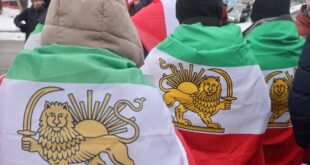TEHRAN (Reuters) — Iran’s judiciary confirmed on Tuesday the detention of an Iranian-American social scientist on charges of spying, one of a number that US officials and think tanks had reported held.
The confirmation by a judiciary official of Kian Tajbaksh’s arrest followed a statement last week by the New York-based Open Society Institute, which said the social scientist and urban planner had been arrested and imprisoned in Iran around May 11.
Tehran accuses Washington of using intellectuals and others inside the country to undermine the Islamic state through what it calls “velvet revolution”. The United States has dismissed the accusation.
The judiciary spokesman said the intelligence ministry was investigating Tajbakhsh’s case.
“Tajbakhsh’s charges are acting against Iran’s national security … and spying for foreigners,” Alireza Jamshidi told a weekly news conference, confirming Tajbakhsh’s arrest.
“The intelligence ministry has launched the complaint against him and investigations are at preliminary stages.” Under Iran’s Islamic Sharia law, the charge could carry the death sentence. Iran has arrested, detained or prevented a number of US-Iranian citizens from leaving the country, including Haleh Esfandiari, the director of the US Woodrow Wilson International Centre for Scholars’ Middle East programme.
Washington has condemned the arrest of Esfandiari, detained on May 8 for acting against national security and spying.
Parnaz Azima, a reporter for US-funded Radio Farda has been kept from leaving Iran and another dual citizen, Ali Shakeri, is also believed to have been banned from leaving Iran.
A Californian institute with which he is affiliated says he has not been heard of since March, but the judiciary spokesman denied reports Shakeri had been arrested. In a report issued on Thursday, rights group Human Rights Watch quoted Shakeri’s unnamed associates as saying he was “being detained by the Iranian authorities.” Washington and Tehran are at odds over Iran’s nuclear programme, which the West suspects is aimed at making atom bombs. They have not had diplomatic ties since just after Iran’s 1979 Islamic revolution, which toppled the US-backed Shah.
The two countries held the most high-profile US-Iran talks in almost 30 years on Monday, but the discussions in Baghdad were restricted to Iraq.
US officials believe Tehran may also be holding former FBI official Robert Levinson, who went missing early in March while on a visit to the Iranian island of Kish. Iran has denied this.
 Eurasia Press & News
Eurasia Press & News



